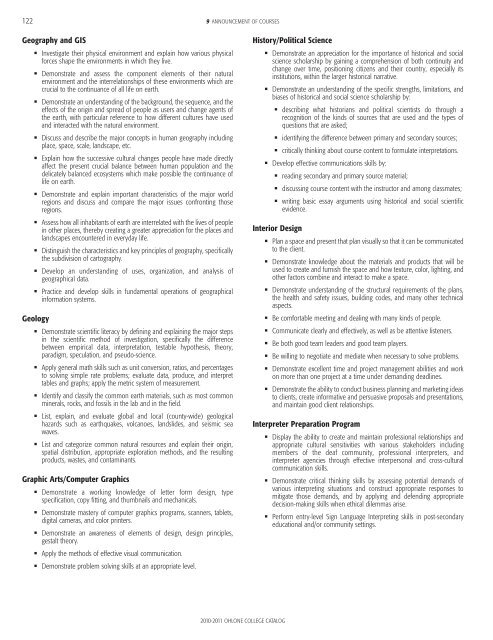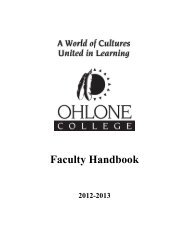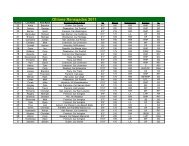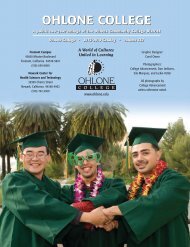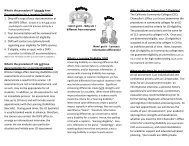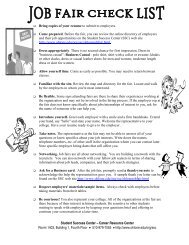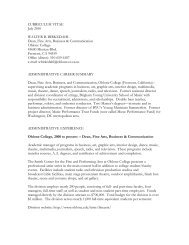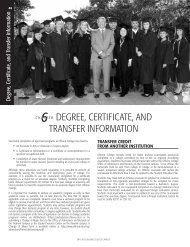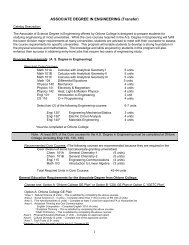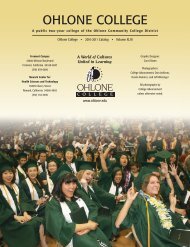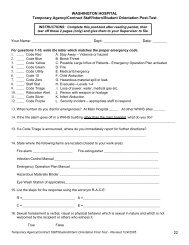2010-2011 Catalog (all pages) - Ohlone College
2010-2011 Catalog (all pages) - Ohlone College
2010-2011 Catalog (all pages) - Ohlone College
Create successful ePaper yourself
Turn your PDF publications into a flip-book with our unique Google optimized e-Paper software.
122 9 ANNOUNCEMENT OF COURSES<br />
Geography and GIS<br />
History/Political Science<br />
n Investigate their physical environment and explain how various physical<br />
forces shape the environments in which they live.<br />
n<br />
n Demonstrate and assess the component elements of their natural<br />
environment and the interrelationships of these environments which are<br />
crucial to the continuance of <strong>all</strong> life on earth.<br />
n<br />
n Demonstrate an understanding of the background, the sequence, and the<br />
effects of the origin and spread of people as users and change agents of<br />
the earth, with particular reference to how different cultures have used<br />
and interacted with the natural environment.<br />
n<br />
n Discuss and describe the major concepts in human geography including<br />
place, space, scale, landscape, etc.<br />
n<br />
n<br />
n Explain how the successive cultural changes people have made directly<br />
n<br />
affect the present crucial balance between human population and the<br />
delicately balanced ecosystems which make possible the continuance of<br />
n<br />
life on earth.<br />
n<br />
n Demonstrate and explain important characteristics of the major world<br />
regions and discuss and compare the major issues confronting those<br />
n<br />
regions.<br />
n Assess how <strong>all</strong> inhabitants of earth are interrelated with the lives of people<br />
in other places, thereby creating a greater appreciation for the places and Interior Design<br />
landscapes encountered in everyday life.<br />
n<br />
n Distinguish the characteristics and key principles of geography, specific<strong>all</strong>y<br />
the subdivision of cartography.<br />
n<br />
n Develop an understanding of uses, organization, and analysis of<br />
geographical data.<br />
n Practice and develop skills in fundamental operations of geographical<br />
n<br />
information systems.<br />
n<br />
n Demonstrate scientific literacy by defining and explaining the major steps<br />
n<br />
in the scientific method of investigation, specific<strong>all</strong>y the difference<br />
between empirical data, interpretation, testable hypothesis, theory,<br />
n<br />
paradigm, speculation, and pseudo-science.<br />
n<br />
n Apply general math skills such as unit conversion, ratios, and percentages<br />
n<br />
to solving simple rate problems; evaluate data, produce, and interpret<br />
tables and graphs; apply the metric system of measurement.<br />
n<br />
n Identify and classify the common earth materials, such as most common<br />
minerals, rocks, and fossils in the lab and in the field.<br />
n List, explain, and evaluate global and local (county-wide) geological<br />
hazards such as earthquakes, volcanoes, landslides, and seismic sea<br />
waves.<br />
n<br />
n List and categorize common natural resources and explain their origin,<br />
spatial distribution, appropriate exploration methods, and the resulting<br />
products, wastes, and contaminants.<br />
n<br />
n Demonstrate a working knowledge of letter form design, type<br />
specification, copy fitting, and thumbnails and mechanicals.<br />
n Demonstrate mastery of computer graphics programs, scanners, tablets,<br />
digital cameras, and color printers.<br />
n<br />
n Demonstrate an awareness of elements of design, design principles,<br />
gestalt theory.<br />
n Apply the methods of effective visual communication.<br />
Geology<br />
Graphic Arts/Computer Graphics<br />
Demonstrate an appreciation for the importance of historical and social<br />
science scholarship by gaining a comprehension of both continuity and<br />
change over time, positioning citizens and their country, especi<strong>all</strong>y its<br />
institutions, within the larger historical narrative.<br />
Demonstrate an understanding of the specific strengths, limitations, and<br />
biases of historical and social science scholarship by:<br />
describing what historians and political scientists do through a<br />
recognition of the kinds of sources that are used and the types of<br />
questions that are asked;<br />
identifying the difference between primary and secondary sources;<br />
critic<strong>all</strong>y thinking about course content to formulate interpretations.<br />
Develop effective communications skills by:<br />
reading secondary and primary source material;<br />
discussing course content with the instructor and among classmates;<br />
writing basic essay arguments using historical and social scientific<br />
evidence.<br />
Plan a space and present that plan visu<strong>all</strong>y so that it can be communicated<br />
to the client.<br />
Demonstrate knowledge about the materials and products that will be<br />
used to create and furnish the space and how texture, color, lighting, and<br />
other factors combine and interact to make a space.<br />
Demonstrate understanding of the structural requirements of the plans,<br />
the health and safety issues, building codes, and many other technical<br />
aspects.<br />
Be comfortable meeting and dealing with many kinds of people.<br />
Communicate clearly and effectively, as well as be attentive listeners.<br />
Be both good team leaders and good team players.<br />
Be willing to negotiate and mediate when necessary to solve problems.<br />
Demonstrate excellent time and project management abilities and work<br />
on more than one project at a time under demanding deadlines.<br />
Demonstrate the ability to conduct business planning and marketing ideas<br />
to clients, create informative and persuasive proposals and presentations,<br />
and maintain good client relationships.<br />
Interpreter Preparation Program<br />
Display the ability to create and maintain professional relationships and<br />
appropriate cultural sensitivities with various stakeholders including<br />
members of the deaf community, professional interpreters, and<br />
interpreter agencies through effective interpersonal and cross-cultural<br />
communication skills.<br />
Demonstrate critical thinking skills by assessing potential demands of<br />
various interpreting situations and construct appropriate responses to<br />
mitigate those demands, and by applying and defending appropriate<br />
decision-making skills when ethical dilemmas arise.<br />
Perform entry-level Sign Language Interpreting skills in post-secondary<br />
educational and/or community settings.<br />
<strong>2010</strong>-<strong>2011</strong> OHLONE COLLEGE CATALOG


